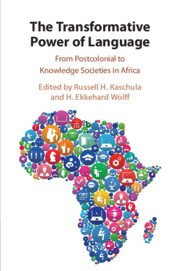Book contents
- The Transformative Power of Language
- The Transformative Power of Language
- Copyright page
- Contents
- Figures
- Tables
- Contributors
- Preface
- Abbreviations and Acronyms
- Introduction
- Part I Mental Decolonisation and Cultural Diversity
- Part II Multilingualism and Intellectualisation of African Languages
- 4 Transformative Power of Language Policies in Higher Education
- 5 African Languages in Transformation
- 6 Linguistic Diversity in Higher Education
- 7 An Impact Study with Reference to isiXhosa and Afrikaans Multilingual Glossaries for First-Year Law of Contracts Students at Cape Peninsula University of Technology
- 8 The Need for Multicultural and Multilingual Sensitivity in Transforming Graphic Design Curriculum in a University of Technology
- 9 An Analysis of the Language Legislation Effects in the Banking Sector
- Part III Digitalisation and Democratisation of Knowledge
- Part IV Interlingual and Intercultural Cross-Fertilisation
- Index
- References
6 - Linguistic Diversity in Higher Education
Inclusion or Exclusion?
from Part II - Multilingualism and Intellectualisation of African Languages
Published online by Cambridge University Press: 18 September 2020
- The Transformative Power of Language
- The Transformative Power of Language
- Copyright page
- Contents
- Figures
- Tables
- Contributors
- Preface
- Abbreviations and Acronyms
- Introduction
- Part I Mental Decolonisation and Cultural Diversity
- Part II Multilingualism and Intellectualisation of African Languages
- 4 Transformative Power of Language Policies in Higher Education
- 5 African Languages in Transformation
- 6 Linguistic Diversity in Higher Education
- 7 An Impact Study with Reference to isiXhosa and Afrikaans Multilingual Glossaries for First-Year Law of Contracts Students at Cape Peninsula University of Technology
- 8 The Need for Multicultural and Multilingual Sensitivity in Transforming Graphic Design Curriculum in a University of Technology
- 9 An Analysis of the Language Legislation Effects in the Banking Sector
- Part III Digitalisation and Democratisation of Knowledge
- Part IV Interlingual and Intercultural Cross-Fertilisation
- Index
- References
Summary
The linguistic diversity in the universities of South Africa is a valuable resource that requires a multilingual approach in all academic domains in recognition of the linguistic repertoires of students for inclusion, education equity, access and success. Historically, English and Afrikaans were the main languages of instruction in higher education during the colonial and apartheid regime. The democratic breakthrough of 1994 brought linguistic relief in South Africa because nine African languages were recognised as official languages. This chapter examines how two universities use language policy for the access and success of the students and to what extent the African languages are integrated as academic languages. The findings show that there is progress in multilingual practices at one university while another one maintains monolingualism. A lot needs to be done to promote multilingualism in the institutions of higher learning.
Keywords
- Type
- Chapter
- Information
- The Transformative Power of LanguageFrom Postcolonial to Knowledge Societies in Africa, pp. 125 - 152Publisher: Cambridge University PressPrint publication year: 2020

